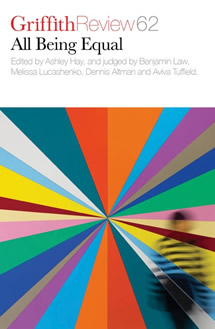Reviewed by Rama Gaind.
By Ashley Hay, Text Publishing, $27.99.
 This is an investigation of the most personal kind. In 2017, after a decade of what was at times an unpleasant and discordant debate, Australians made it clear that their understanding of equality included formal recognition of the most intimate relationships.
This is an investigation of the most personal kind. In 2017, after a decade of what was at times an unpleasant and discordant debate, Australians made it clear that their understanding of equality included formal recognition of the most intimate relationships.
Australia said ‘Yes’ to same-sex marriage – a momentous event that confirmed the nation’s ‘appetite for change and equality’.
Griffith Review 62: All Being Equal investigates what this means. Is it a sign of a new-found appetite for equality? The primacy of love and family? A measure of a flawed political process? Perhaps, it’s the mark of a new approach to political decision-making?
GR62 marks this event with a selection of stories that predate, anticipate and celebrate that historic moment: stories of love and despair; of families, protest and war.
Edited by Ashley Hay, it features the winners of the sixth novella project, and maps the richness and complexity of Australia – past and present.
“… This year’s annual novella edition acknowledges, in part, these symbols and the narratives that hold them. Its theme – ‘All Being Equal ‘ – was conceived in late 2017, partly as a response to the resounding ‘Yes’ vote recorded in that year’s postal survey. Its call for entries pondered ‘appetites for equality’ and ‘the primacy of love’, and many of its submissions spoke directly to the idea of marriage equality.”
This year’s winners of the novella competition are Erin Gough, Lucy Neave, Holden Sheppard, Mariam Sved and Daniel Young. They were selected from an “outstanding field” of more than 60 entries by judging panel comprised of Benjamin Law, Dennis Altman, Melissa Lucashenko and Aviva Tuffield, along with the staff of Griffith Review.
“They hold elements of celebration and lamentation, of moments caught and moments missed. The intense intimacy of each is a vivid reminder of the many ways in which individuals and their stories often disappeared beneath the broad political sweep of the campaigning around the postal vote. These are windows into individual lives, with all their complexities and choices.”


